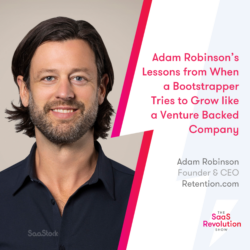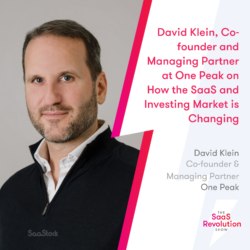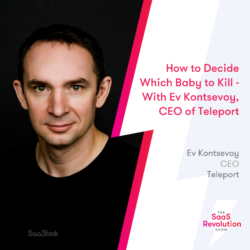This is a guest post by Richard Howard, AWS Startup Business Development. AWS Startups were one of the sponsors at SaaStock 2019. This article was originally published on the AWS Startups Blog. Photo by NESA by Makers on Unsplash
When I founded my startup in 2014, I was the very definition of a non-technical CEO. As somebody who’d been in finance and then in commercial roles at a couple of startups, engineering, to me, was basically witchcraft. Luckily for me, my co-founder, who I had worked with for over a year at a different startup, was a great engineer. Together, our skills balanced out and because we knew and trusted one another, we were able to approach our startup did so as equals.
Looking back, I totally lucked out with my co-founder, but have since heard dozens of stories of non-technical founders that either couldn’t find a technical co-founder, or worse, picked the wrong one. I wanted to write a guide for those that weren’t as lucky as me. How do you build a product and hire technical talent when you’re a non-technical founder?
Don’t be that person
There are lots of places, like Workinstartups or techcofounder.com where you can try and find a technical co-founder. What you don’t want to be is the person that posts something like “I have a great idea for a business. Just need a CTO to build the product.” You might as well write, “I have a great idea for a book. Just need someone to write it.”
How much more attractive would it be to instead say to a potential CTO, something like: “Got an MVP built, , and first customers are onboarded and spending money. Now looking for somebody to help build out additional features and scale up the product.” Good engineers have hundreds of potential options of places to work. If you want them to work with you, you’re going to have to show that you can get stuff done whilst they are writing code.
Get something built
Reid Hoffman famously said that if you’re not embarrassed by your first product, you released it too late. At the very early stage, you’re not trying to prove that you have a beautiful product. You’re trying to prove that there is a market for the solution that you want to build. Prove that in any way that you can, even if it’s with basic tools. For example, I met a non-technical CEO last year who built a whole business on Whatsapp and Excel by himself. He proved that there was a market for his solution and now that solo founder has a team of eight.
If you really do need to build something at least somewhat technical to prove your thesis, don’t be afraid of hiring a freelancer or an agency. Just beware that you get what you pay for, quality-wise, so look for recommendations from people that you trust and set up milestone payment plans. If you don’t have any good recommendations, you can find freelancers on Upwork or Fiverr. Price isn’t always an indicator of quality, but when it comes to engineers, the cheapest are usually the cheapest for a reason.
Don’t give away the farm
You’ve now built some variation of an MVP and got some paying customers on board. Great! Now it’s time to make that engineering hire. One mistake that non-technical founders make in this situation is getting so excited that any engineer would work for their company, they perform less due diligence than they would for any other hire. They also give away more seniority and equity than they should. Don’t skip over calling references just because you want someone in the door.
It’s also important that you’re realistic about the level of the engineer that you’re hiring. Your first hire shouldn’t automatically be made your Chief Technology Officer, unless they actually deserve that title. Engineer, Senior Engineer or Lead Engineer is a perfectly acceptable title depending on their experience. A CTO is a senior position that will (if everything goes well) have a lot of direct reports in the future. Is this person ready for that? Also, every engineer you hire in the future is going to have to go through some kind of coding assessment. As someone who is non-technical, you won’t be able to administer this yourself. But if you have a friend that is an engineer, it would make sense to ask them to perform this function for you to assess the skill level of this potential hire.
You can lose a lot of time with a bad engineering hire, particularly if you give them co-founder/CTO status. Make sure any equity you give has a standard four-year vesting period and if you don’t think the person is ready to be CTO, be honest with them as to why. And if you think they deserve it, show them a path towards getting there.
Conclusion
Being a non-technical startup CEO of a startup puts you at a disadvantage at the very early stages because you can’t just put your head down and build product. Accept that fact and supercharge what you can bring to the business, whether that’s sales, marketing, or fundraising. Be realistic in assessing any engineering hires against the role they will perform if you grow to be a 50-a 50 person company. And finally, if you can prove that there’s a market for your solution without building something too complicated, do it. And do it now.





